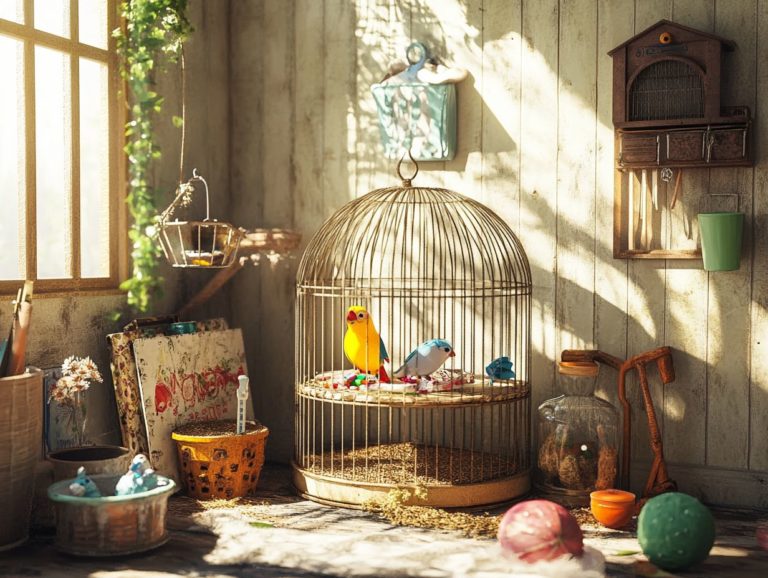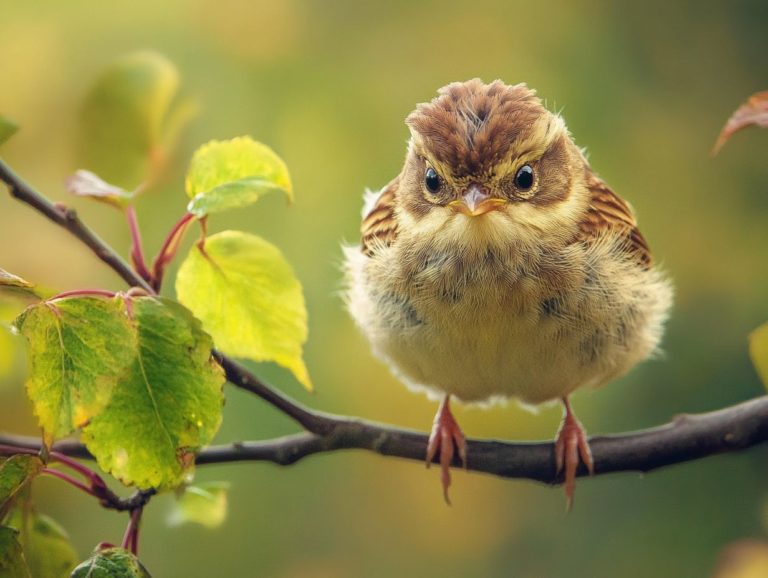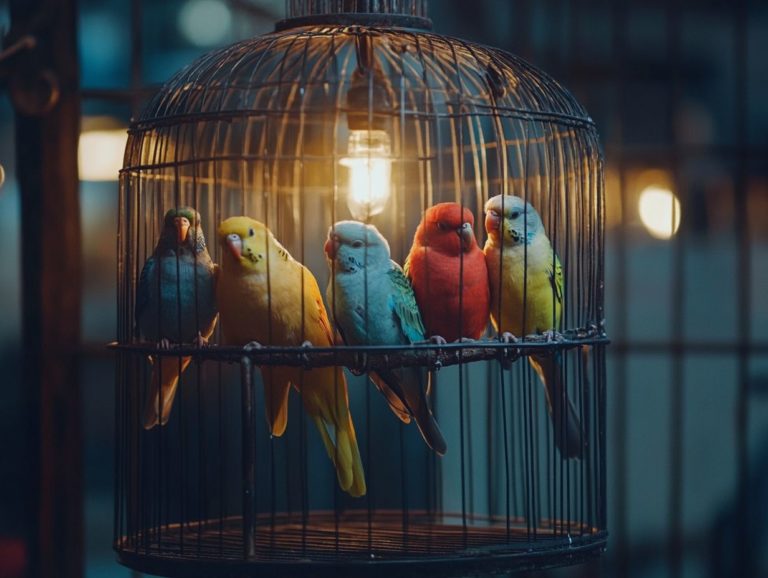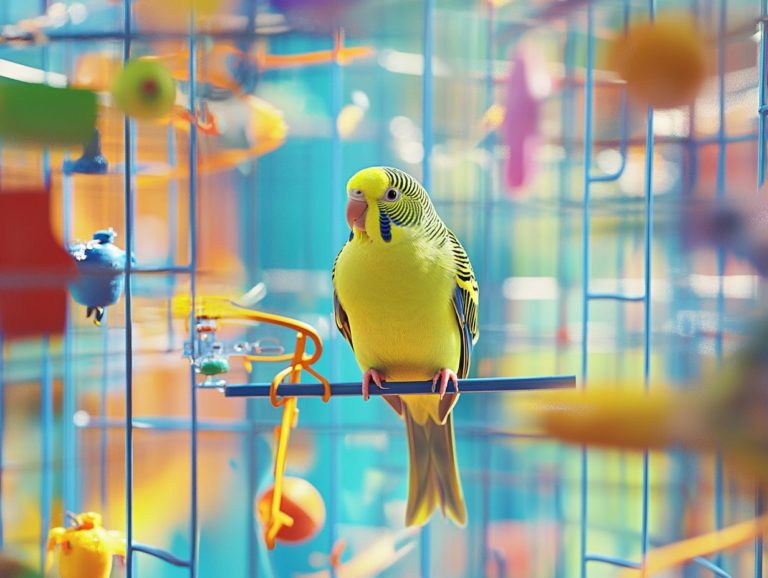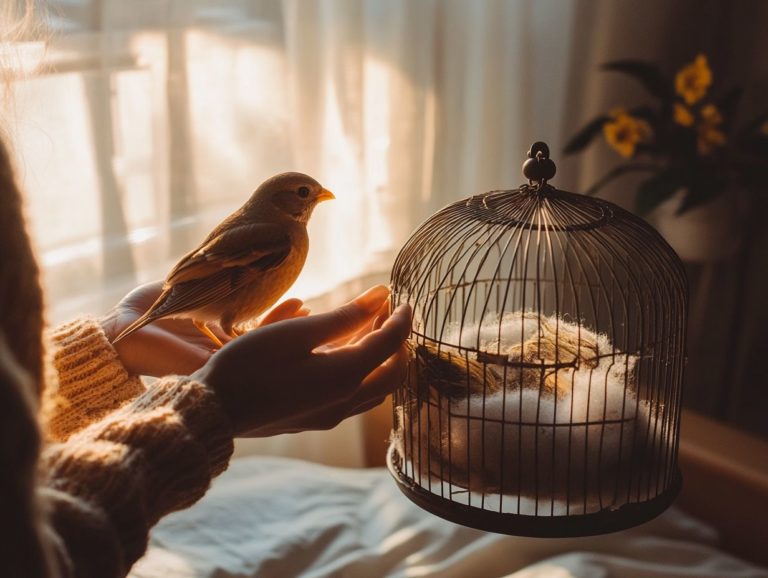What Are the Best Foods for Parakeets?
A balanced diet is crucial for ensuring your parakeets remain happy and healthy. By understanding the best food options available, you can significantly enhance their well-being.
This article delves into the top food choices, including nutrient-rich seed mixes, pellets, and vibrant fruits and vegetables. It highlights the importance of proteins and supplements, guides you on portion sizes, and considers factors like age and environment.
You ll also discover delectable treat ideas that are both safe and delightful for your feathered companions. Get ready to give your parakeets the nutrition they truly deserve!
Contents
- Key Takeaways:
- Importance of a Balanced Diet
- Best Foods for Parakeets
- How to Feed Parakeets
- Other Factors to Consider
- Treats for Parakeets and Their Nutritional Benefits
- Frequently Asked Questions
- What Are the Best Foods for Parakeets?
- What type of seeds should I feed my parakeet?
- Can parakeets eat fruits and vegetables?
- Are there any foods I should avoid feeding my parakeet?
- Do I need to supplement my parakeet’s diet with any vitamins or minerals?
- How often should I change my parakeet’s food and water?
Key Takeaways:
- Parakeets require a balanced and varied diet to maintain their health and well-being.
- Seed mixes, pellets, fruits, and vegetables are all important components of a parakeet’s diet.
- It’s important to feed parakeets appropriate portion sizes and frequency, considering their age, health, and environment.
Importance of a Balanced Diet
A balanced diet is essential for the health and happiness of your budgies, significantly impacting their overall well-being, vitality, and lifespan. By offering a diverse array of natural foods like seeds, fruits, and vegetables you help your budgies meet their nutritional needs while avoiding harmful chemicals and synthetic ingredients.
To guarantee optimal wellness, it’s vital to consult the Bird Food Guide for thorough dietary insights and recommendations.
Best Foods for Parakeets
Choosing the finest foods for parakeets is crucial for their well-being. High-quality pellets, such as Harrison s Super Fine and Roudybush Nibbles, along with premium seed mixes like Goldenfeast Australian Blend and Petite Hookbill Legume, are excellent options.
Incorporating these recommended products into your parakeet’s diet ensures they enjoy balanced nutrition that promotes long-term health and vitality.
Seed Mixes and Pellets
Seed mixes and pellets are the foundation of your parakeet’s diet, delivering essential nutrients and variety to keep them vibrant and lively. Opt for well-balanced seed mixes enriched with vitamins and minerals, and pair these with high-quality pellets to ensure your parakeet gets all the necessary nutrients in a digestible form.
Incorporating both seed mixes and pellets not only enhances flavor but also promotes superior overall health. Seed mixes provide a range of seeds that stimulate foraging behavior, allowing your parakeet to engage in natural feeding habits. This variety supports their appetite and encourages playful behavior, vital for their mental stimulation.
These food options cater to different dietary needs, accommodating age, activity level, and health conditions, all essential for maintaining your parakeet s optimal well-being.
Fruits and Vegetables
Fresh fruits and vegetables are essential to your parakeet’s diet, providing vital nutrients and hydration. Offer fruits like mango and pineapple. For veggies, try carrots and broccoli. This balanced intake boosts immunity and supports digestive health.
These vibrant options not only please your parakeet s palate but also enhance their energy levels and promote feather health. To maximize appeal, dice the fruits into bite-sized pieces or skewer them for added engagement. Vegetables can be served raw or lightly steamed to preserve their nutrients.
Regularly changing the selection keeps mealtime exciting and prevents boredom, encouraging healthy eating habits. Introducing new foods gradually allows your feathered friend to adjust and discover their preferences, fostering a lifelong habit of nutritious eating.
Start today and watch your parakeets thrive!
Proteins and Supplements
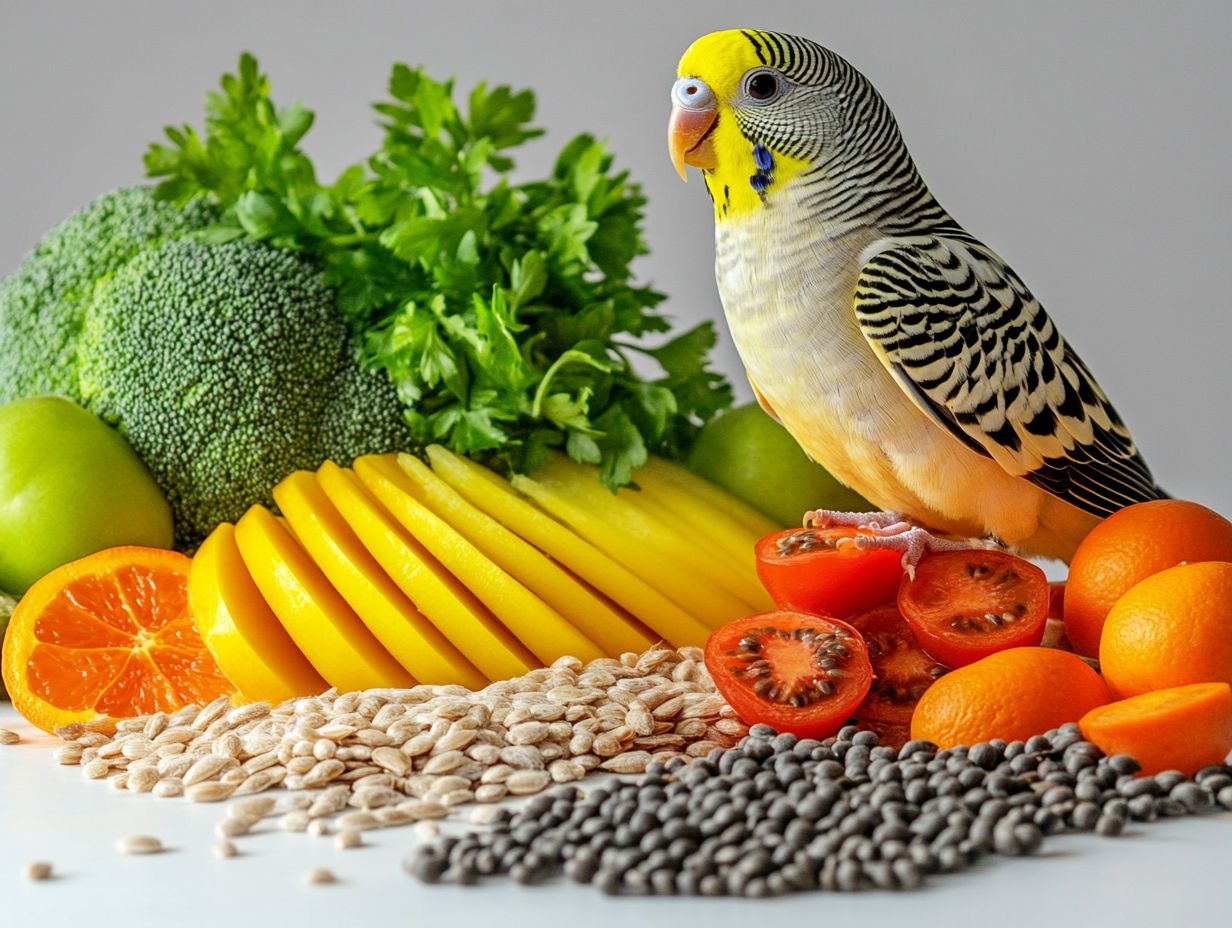
Proteins and supplements enrich your parakeet’s diet. They help muscle development and overall vitality. While fresh vegetables provide some protein, adding extra sources like cooked legumes, eggs, or specialized supplements is key to ensuring your parakeet gets the nutrition it needs for optimal health.
Diving into diverse protein sources is crucial; it not only supports growth but also bolsters the immune system. For example, cooked lentils or chickpeas make fantastic additions, as these legumes are packed with easily digestible proteins that birds thrive on. Introducing small pieces of hard-boiled eggs can also offer a delightful protein boost, keeping your parakeet engaged with its meals.
You ll find many pet stores stock specially formulated protein supplements tailored to meet the special dietary needs of parakeets, effectively bridging any nutritional gaps. Actively monitor your parakeet s diet for a healthier, happier bird!
How to Feed Parakeets
Feeding parakeets properly requires a thoughtful approach to their dietary needs. It s essential to determine suitable portion sizes and establish a feeding schedule that promotes optimal health.
By creating a consistent feeding schedule tailored to the age and activity level of your budgies, you can effectively balance their intake of seed mixes, pellets (small, compressed food pieces designed for birds), fresh fruits, and vegetables. This harmonious blend plays a crucial role in supporting their overall wellness.
Proper Portion Sizes and Frequency
Understanding proper portion sizes and feeding frequency is essential for ensuring your budgies enjoy optimal wellness. Overfeeding can lead to obesity and other health issues you certainly want to avoid. A balanced diet typically includes a combination of pellets, seed mixes (blends of different seeds suitable for parakeets), and fresh produce offered in manageable portions, tailored to each parakeet s individual needs and activity levels.
For example, younger or more active parakeets may require slightly larger portions to support their growth and energy. In contrast, older or less active birds might do better with smaller amounts to maintain a healthy weight. A practical approach is to keep an eye on their eating habits. If you notice food consistently left uneaten after several hours, that s a clear sign the portion size might be too large.
Establishing a consistent feeding schedule twice a day for adults and three times for young parakeets will help keep their appetite in check and ensure they receive the essential nutrients they need throughout the day.
Other Factors to Consider
When caring for parakeets, it s crucial to consider a range of factors that influence their diet and overall health. This includes their age, specific health conditions, and environmental influences.
Younger budgies typically have different nutritional needs compared to their older counterparts. Factors like temperature and humidity significantly impact their dietary needs, making it essential for you to adapt your feeding practices to suit their individual needs.
Age and Health of Parakeets
The age and health of your parakeets are crucial factors when determining their dietary needs. These aspects can vary significantly from one bird to another.
Young parakeets often require a higher protein content to support their growth. In contrast, older or ailing birds might thrive on softer foods that are easier to digest. Make careful dietary adjustments based on their specific health conditions.
As your parakeets transition from youth to adulthood, their nutritional needs will evolve. This shift highlights the importance of providing a balanced diet that includes a variety of seeds, fruits, and vegetables. Adult parakeets depend on a diet full of healthy foods to maintain their energy levels and overall health.
Senior birds may encounter challenges like obesity or dental issues, necessitating softer, low-fat food options.
If health problems like feather plucking or obesity arise, consider increasing fiber content and incorporating vitamin-rich foods to support their recovery and enhance their well-being. Regular assessments can greatly enhance your parakeet’s quality of life.
Environmental Factors
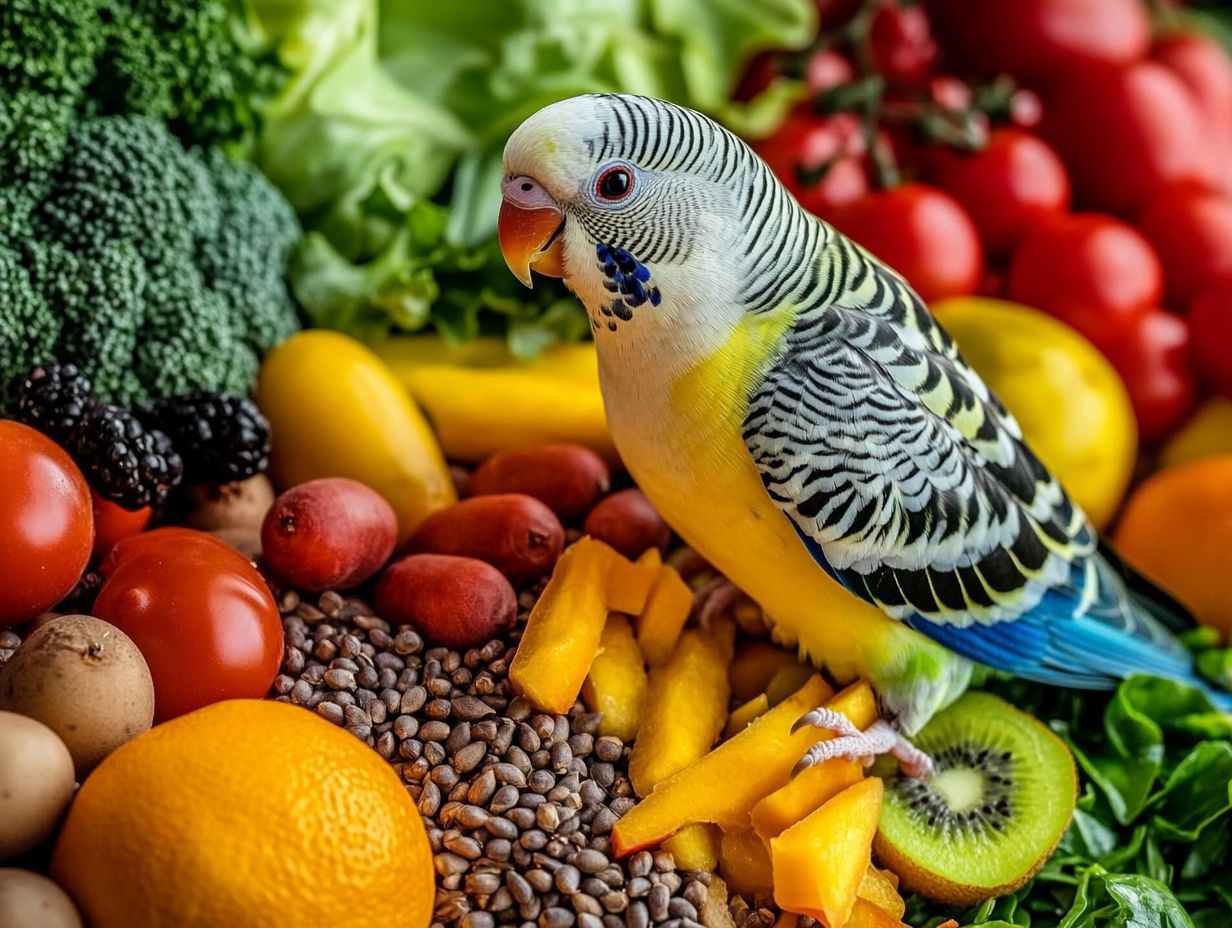
Environmental factors like temperature and humidity significantly shape the dietary needs of your parakeets. These factors influence their appetite and food preferences.
In warmer conditions, your budgies will likely need to increase their water intake. This directly impacts the types of fruits and vegetables you should provide to keep them hydrated and healthy.
During the hotter months, include water-rich options like cucumbers and melons in their diet to help stave off dehydration. Conversely, when temperatures drop, a more energy-dense diet featuring seeds and nuts can be beneficial.
Indoor climate control also plays a role, as variations in humidity and artificial lighting can lead to changes in their feeding behavior. Pay attention to how your parakeet’s activity levels change with the seasons and adjust their portions to avoid becoming overweight or undernourished.
Treats for Parakeets and Their Nutritional Benefits
Treats can add a delightful touch to your parakeet’s diet, but it s vital to ensure that these snacks are both healthy and safe for them to enjoy.
While numerous commercial options are available, consider offering homemade treats crafted from fresh ingredients like fruits or nuts. This satisfies their taste buds and contributes positively to their nutritional needs.
Healthy and Safe Options
When selecting healthy and safe treat options for your parakeets, choose foods that enhance their diet without compromising their health. Nutrient-rich treats, such as small pieces of fruit, nuts, and seeds, can serve as delightful rewards when offered in moderation.
Incorporating colorful vegetables can introduce vital vitamins and minerals into their meals. For example, finely chopped carrots or bell peppers not only pique their curiosity but also help boost their immune system.
Introduce new foods gradually, allowing you to monitor for any adverse reactions and prevent digestive upset. Maintaining proper portion control is key to avoiding overindulgence; a small treat should make up no more than 10% of their daily intake, with frequency adjusted according to their activity level and overall health.
Regularly including a mineral block or cuttlebone is beneficial. These provide essential calcium for your parakeets.
By adopting a balanced approach and including a variety of natural food options free from chemicals, dyes, and preservatives, you can effectively enrich your parakeets diets while promoting their well-being.
Frequently Asked Questions
What Are the Best Foods for Parakeets?
The best foods for parakeets include seeds, fresh fruits and vegetables, and commercial parakeet food.
For more tips on parakeet care and nutrition, explore our resources or subscribe for updates!
What type of seeds should I feed my parakeet?
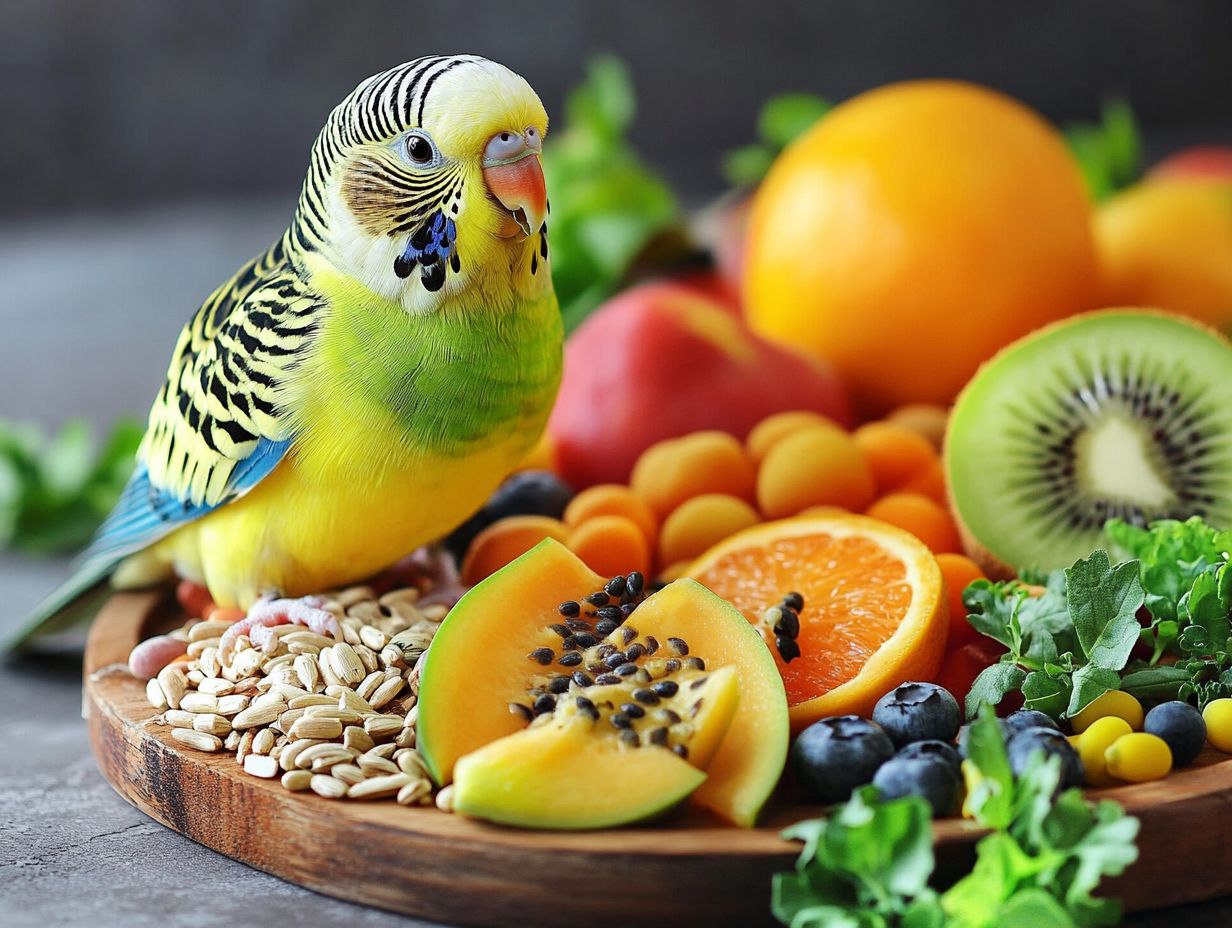
You should feed your parakeet a mix of high-quality seeds such as Canary Grass Seed, White Millet, Red Millet, Oat Groats, and Hemp Seed.
Can parakeets eat fruits and vegetables?
Yes, parakeets can eat a variety of fresh fruits and vegetables, including apples, carrots, leafy greens, and orange peel.
Are there any foods I should avoid feeding my parakeet?
Absolutely avoid giving your parakeet avocado, chocolate, caffeine, and any foods with artificial ingredients. These can be harmful!
Do I need to supplement my parakeet’s diet with any vitamins or minerals?
A well-balanced diet of seeds, fruits, and vegetables usually provides your parakeet with all the necessary vitamins and minerals.
You can provide a cuttlebone a natural source of calcium that helps birds’ bones and beaks or a mineral block for extra calcium and minerals.
How often should I change my parakeet’s food and water?
Make sure to provide fresh food and water daily for your parakeet s health. Fresh options keep them happy and vibrant!
Include choices like orange peel and parsley for added flavor.

